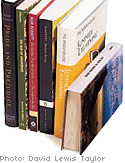So Many Books, So Little Space!

We believe in the promise of books—they'll open our minds and our souls and take us to places we've never been. We find it gut-wrenching to give them away, even when we've run out of storage space. Excess begets chaos, and finding the time to read is even harder when you can't get your hands on the book you know you have...somewhere. This month's project is to first edit and then organize your collection.
1. To thy own self be true. Before you do anything, ask yourself, "Why do I stockpile books? Is it to have meaningful words nearby? To lend to friends? To build a reference library? To create a particular atmosphere? Do I plan to read the books or just have them in the background?" Your collection should reflect your intention.
2. Find the keepers. Empty your shelves, grouping books into categories you would find in a library or bookstore (biography, poetry, fiction, self-help) on the floor. Does the size of each pile reflect your interests and goals now? Hold on to works that made a lasting impression, the two or three best reference books on any topic, the classics, your favorite authors, signed volumes, and all new books until you've had a chance to read them (or for one year, whichever comes first.)
3. Rearrange your shelves. Once you've decided what stays and what goes, you can start planning the layout of your library. If bookcases live all over the house, assign categories to specific rooms. Consider both the available space and where you read. For example, biographies in the living room; reference works in the study. Arrange books in each category alphabetically by author or subject. If your shelf space is limited, group books by size.
4. Expand your storage. Get creative! Try framing a window, fireplace, or doorway with floor-to-ceiling bookshelves. Narrow shelves can also be recessed between wall studs in a hallway without cramping your space. Ready-made modular systems allow you to create storage in odd-shaped areas, around corners and under stairs, without the expense of custom cabinetry. Check out smartfurniture.com (1-888-GO-SMART), and Bookboxes from Levenger (www.levenger.com). You can use small bookshelves as end tables in your living room or bedroom.
5. Send them packing. Parting with the giveaways is easier when you know they're going to someone who'll use them. You can donate to schools, libraries, prisons, senior centers, or hospitals. Or ship the gift of reading to the International Book Project (www.intlbookproject.org) or the Global Literacy Project (wwwglpinc.org); both foster community-based literacy initiatives in Africa, Asia, and other parts of the world. If you'd rather sell, try eBay's www.half.com or a used-book store.
6. Now read. A University of California-Berkeley study found that all the information released (books, newspapers, film, etc.) in just 2002 would fill half a million libraries the size of the Library of Congress. You'll never get to it all. Schedule regular times to read—during your commute, before bed, and on vacation—but be realistic. Now you can find your books, you have fighting chance of enjoying them.
Next: How to love your literary layout and decorate with the books you keep!
1. To thy own self be true. Before you do anything, ask yourself, "Why do I stockpile books? Is it to have meaningful words nearby? To lend to friends? To build a reference library? To create a particular atmosphere? Do I plan to read the books or just have them in the background?" Your collection should reflect your intention.
2. Find the keepers. Empty your shelves, grouping books into categories you would find in a library or bookstore (biography, poetry, fiction, self-help) on the floor. Does the size of each pile reflect your interests and goals now? Hold on to works that made a lasting impression, the two or three best reference books on any topic, the classics, your favorite authors, signed volumes, and all new books until you've had a chance to read them (or for one year, whichever comes first.)
3. Rearrange your shelves. Once you've decided what stays and what goes, you can start planning the layout of your library. If bookcases live all over the house, assign categories to specific rooms. Consider both the available space and where you read. For example, biographies in the living room; reference works in the study. Arrange books in each category alphabetically by author or subject. If your shelf space is limited, group books by size.
4. Expand your storage. Get creative! Try framing a window, fireplace, or doorway with floor-to-ceiling bookshelves. Narrow shelves can also be recessed between wall studs in a hallway without cramping your space. Ready-made modular systems allow you to create storage in odd-shaped areas, around corners and under stairs, without the expense of custom cabinetry. Check out smartfurniture.com (1-888-GO-SMART), and Bookboxes from Levenger (www.levenger.com). You can use small bookshelves as end tables in your living room or bedroom.
5. Send them packing. Parting with the giveaways is easier when you know they're going to someone who'll use them. You can donate to schools, libraries, prisons, senior centers, or hospitals. Or ship the gift of reading to the International Book Project (www.intlbookproject.org) or the Global Literacy Project (wwwglpinc.org); both foster community-based literacy initiatives in Africa, Asia, and other parts of the world. If you'd rather sell, try eBay's www.half.com or a used-book store.
6. Now read. A University of California-Berkeley study found that all the information released (books, newspapers, film, etc.) in just 2002 would fill half a million libraries the size of the Library of Congress. You'll never get to it all. Schedule regular times to read—during your commute, before bed, and on vacation—but be realistic. Now you can find your books, you have fighting chance of enjoying them.
Next: How to love your literary layout and decorate with the books you keep!



